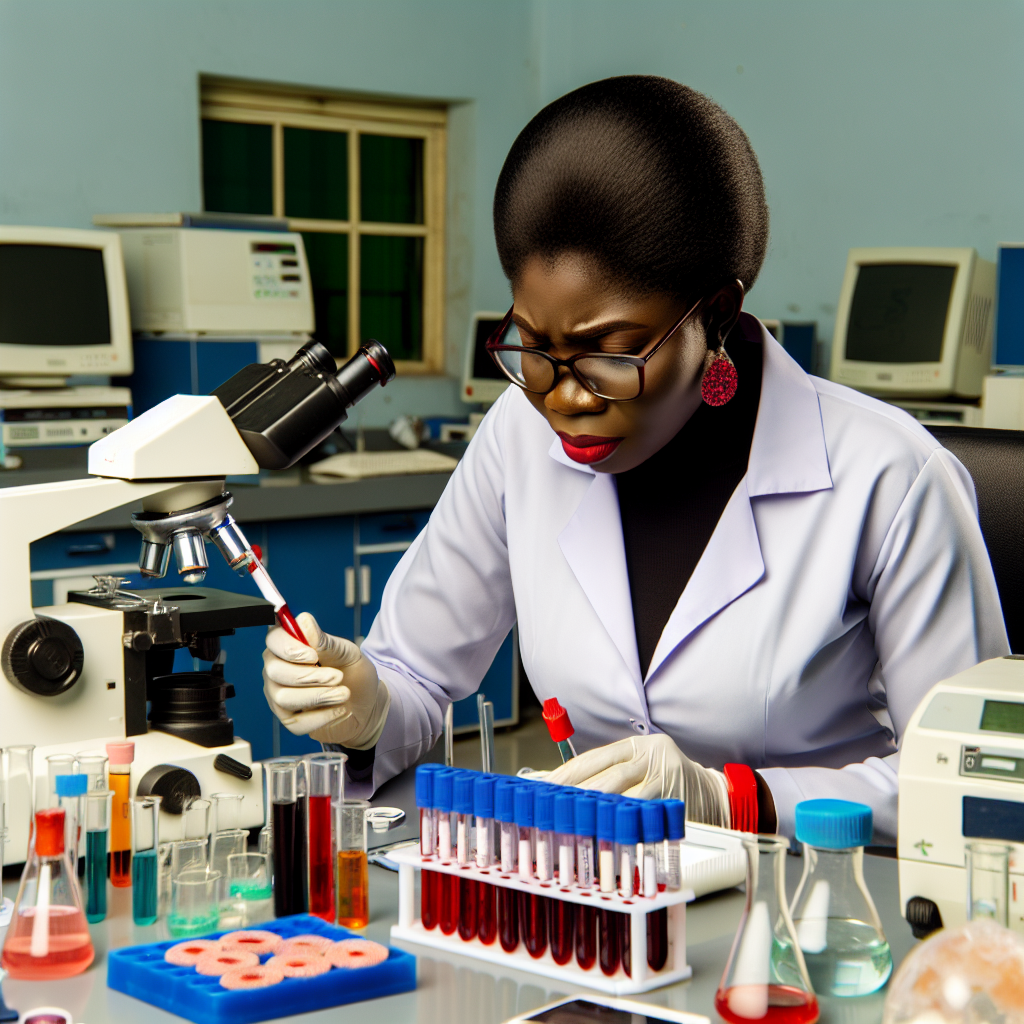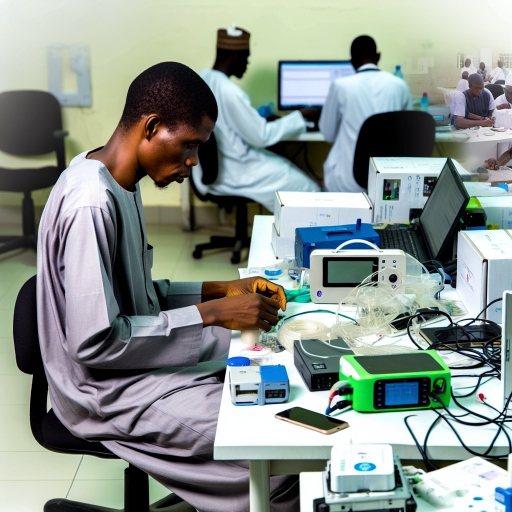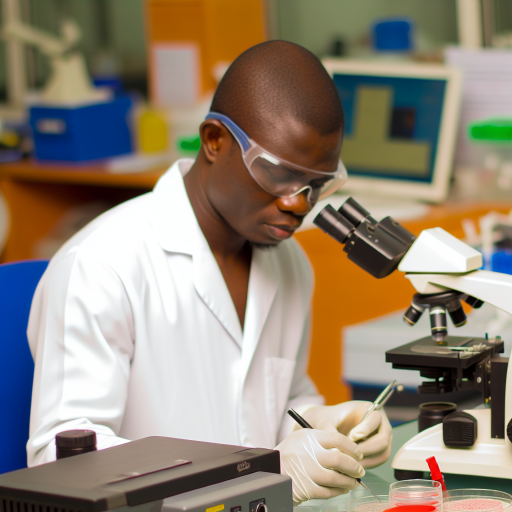Introduction
Medical Biochemistry focuses on the study of biochemical processes within the human body.
Clinical Biochemistry involves the analysis of bodily fluids for diagnostic and therapeutic purposes.
Medical Biochemistry plays a crucial role in understanding the molecular mechanisms of diseases.
It contributes to developing new treatments, resulting in better healthcare outcomes in Nigeria.
Clinical Biochemistry provides vital information for diagnosing and monitoring diseases.
Healthcare professionals use this information to make informed decisions about patient care in Nigeria.
Differences between Medical Biochemistry and Clinical Biochemistry
Medical Biochemistry focuses on understanding the biochemical processes in the body.
Clinical Biochemistry involves the analysis of biochemical components in bodily fluids for diagnostic and therapeutic purposes.
Medical Biochemistry delves into the molecular mechanisms of physiological processes.
Clinical Biochemistry focuses on using biochemical tests for disease diagnosis and monitoring.
Medical Biochemistry is more research-oriented to explore fundamental biochemistry principles.
Clinical Biochemistry is applied in healthcare settings to aid in patient diagnosis and treatment.
Medical Biochemists work in research labs, universities, and pharmaceutical companies.
Clinical Biochemists work in hospitals, diagnostic labs, and healthcare facilities.
Medical Biochemists deal with cell cultures, tissues, and experimental models.
Clinical Biochemists analyze blood, urine, and other bodily fluids from patients.
Medical Biochemists focus on developing new technologies and laboratory techniques.
Clinical Biochemists utilize established methods like spectrophotometry, chromatography, and immunoassays.
Medical Biochemists may not interact directly with patients in their research roles.
Clinical Biochemists collaborate with healthcare providers to interpret test results and recommend treatments.
Medical Biochemistry research follows scientific protocols and ethical guidelines for experimentation.
Clinical Biochemistry labs adhere to strict regulations to ensure accurate and reliable test results for patient care.
Medical Biochemists may pursue careers in academia, biotechnology, or drug development.
Clinical Biochemists can work as laboratory managers, clinical consultants, or research scientists in healthcare organizations.
Medical Biochemistry integrates knowledge from biology, chemistry, and genetics for studying biological processes.
Clinical Biochemistry combines biochemistry with medical principles to understand disease mechanisms and treatment strategies.
Medical Biochemistry contributes to the advancement of medical knowledge and drug discovery.
Clinical Biochemistry plays a crucial role in disease diagnosis, patient management, and monitoring treatment responses.
Medical Biochemists engage in ongoing research to expand scientific knowledge and publish findings in academic journals.
Clinical Biochemists participate in continuing education programs to stay updated on new technologies and advancements in diagnostic testing.
Educational Requirements for Medical Biochemistry:
Medical Biochemistry typically requires a bachelor’s degree in Biochemistry or related field.
Students should have a strong foundation in chemistry, biology, and mathematics.
Some universities may also require additional coursework in anatomy, physiology, and pharmacology.
Hands-on laboratory experience is essential for understanding the practical aspects of biochemistry.
Graduates may pursue further specialization through postgraduate studies or professional certifications.
Educational Requirements for Clinical Biochemistry:
Clinical Biochemistry often requires advanced degrees or certifications in laboratory medicine or clinical biochemistry.
Individuals may need to complete a master’s or doctoral program in clinical biochemistry.
Coursework may focus on clinical laboratory techniques, quality control, and interpretation of test results.
Practical training in hospital or clinical settings is crucial for gaining hands-on experience.
Professional certifications, such as the Medical Laboratory Science Council of Nigeria (MLSCN), may be required for practice.
Transform Your Career with Expert Guidance
Get personalized mentorship consulting that’s tailored to your unique path. Our expert advice is actionable and exclusive.
Get StartedBoth medical biochemistry and clinical biochemistry require a strong educational background in biochemistry and related fields.
While medical biochemistry emphasizes basic research and laboratory techniques, clinical biochemistry focuses on the application of biochemical principles in healthcare settings.
By meeting the educational requirements for these disciplines, individuals can embark on fulfilling careers that contribute to the advancement of healthcare and medicine in Nigeria.
Discover More: Notable Pathologists and Oral Biologists in Nigeria
Roles and Responsibilities in Medical Biochemistry and Clinical Biochemistry:
Medical Biochemists:
- Conduct research to develop new diagnostic tests and treatment options.
- Study biochemical processes at the cellular and molecular levels.
- Explore the interactions between drugs and metabolism.
- Investigate how genetic mutations impact biochemical pathways.
- Collaborate with other healthcare professionals to improve patient care.
Medical biochemists play a crucial role in advancing medical knowledge and developing innovative solutions for diagnosing and treating diseases.
By conducting research, they strive to improve patient outcomes and enhance the practice of medicine.
Clinical Biochemists:
- Analyze patient samples to diagnose and monitor diseases.
- Interpret laboratory test results to provide accurate diagnoses.
- Monitor the effectiveness of treatment protocols through biochemical testing.
- Collaborate with clinicians to develop personalized treatment plans.
- Ensure the accuracy and reliability of laboratory testing procedures.
Clinical biochemists are directly involved in patient care, using their expertise to diagnose and manage various medical conditions.
By analyzing biochemical markers, they help healthcare providers make informed decisions about treatment strategies.
Both medical biochemists and clinical biochemists have distinct roles that complement each other in the healthcare setting.
While medical biochemists focus on research and innovation, clinical biochemists are responsible for directly applying these findings to patient care.
Together, they contribute to the advancement of medical science and the improvement of healthcare outcomes in Nigeria.
Delve into the Subject: Oral Biology and Public Health in Nigeria
Work settings for Medical Biochemistry and Clinical Biochemistry:
Medical Biochemistry
- Medical Biochemists may work in research institutions, universities, or pharmaceutical companies.
Clinical Biochemistry
- Clinical Biochemists are typically employed in hospitals, diagnostic laboratories, or healthcare facilities.
Medical biochemistry and clinical biochemistry are two closely related fields that play vital roles in the diagnosis, treatment, and prevention of diseases in Nigeria.
While both disciplines focus on the study of biochemical processes in living organisms, they differ in terms of their work settings and practical applications.
Work Settings for Medical Biochemistry:
Medical biochemists primarily work in research institutions, universities, or pharmaceutical companies.
These professionals are involved in conducting experiments, analyzing data, and publishing research findings.
They play a crucial role in advancing scientific knowledge and developing new treatments for various illnesses.
In research institutions, medical biochemists work on understanding the molecular mechanisms of diseases such as cancer, diabetes, and cardiovascular disorders.
They collaborate with other scientists to unravel complex biological processes and identify potential targets for drug development.
Universities also provide opportunities for medical biochemists to teach and mentor students.
They may lecture on topics such as biochemistry, cell biology, and genetics.
Additionally, they supervise graduate students pursuing advanced degrees and engage in further research to expand the field’s knowledge base.
Pharmaceutical companies employ medical biochemists to work on drug discovery and development.
These professionals design experiments to test the efficacy and safety of new medications.
They collaborate with pharmacologists, toxicologists, and clinicians to ensure that drugs meet regulatory standards and are effective in treating specific conditions.
Work Settings for Clinical Biochemistry:
Clinical biochemists, on the other hand, are typically employed in hospitals, diagnostic laboratories, or healthcare facilities.
They play a crucial role in analyzing patient samples, interpreting test results, and providing accurate diagnostic information to healthcare providers.
In hospitals, clinical biochemists work in clinical laboratories to run a wide range of biochemical tests on blood, urine, and other bodily fluids.
They use sophisticated instruments and techniques to measure biomarkers associated with various diseases, such as heart attacks, kidney disorders, and metabolic imbalances.
Diagnostic laboratories also employ clinical biochemists to perform specialized tests and ensure the accuracy of results.
These professionals must adhere to strict quality control measures to maintain the reliability and validity of diagnostic tests.
They play a critical role in ensuring that patients receive accurate and timely diagnoses.
In healthcare facilities, clinical biochemists collaborate with other healthcare professionals, including physicians, nurses, and pharmacists, to interpret test results and recommend appropriate treatment options.
They provide valuable insights into a patient’s overall health status and help guide clinical decision-making based on laboratory findings.
See Related Content: Future of Medical Biochemistry Education in Nigeria

Challenges in the Field of Medical Biochemistry and Clinical Biochemistry in Nigeria
Limited funding for research and equipment
In Nigeria, one of the major challenges faced in medical biochemistry and clinical biochemistry is the limited funding available for research projects and acquiring essential equipment.
This lack of financial resources hinders the advancement of studies in these fields and limits the ability of researchers to conduct in-depth investigations.
Research projects require funding to cover expenses such as laboratory supplies, reagents, and equipment maintenance.
Without adequate financial support, scientists in Nigeria struggle to carry out necessary experiments and make scientific breakthroughs.
Furthermore, the lack of funding also affects the quality of research conducted in this field, as researchers may be forced to cut corners due to budget constraints.
Additionally, the limited availability of modern equipment poses a significant challenge to researchers in Nigeria.
Advanced technology is essential for conducting accurate and precise experiments, diagnosing diseases, and developing new treatment methods.
However, many research institutions and healthcare facilities in the country lack access to state-of-the-art equipment.
This hinders their ability to compete on a global scale and make significant contributions to the field of medical biochemistry and clinical biochemistry.
Inadequate training opportunities and access to advanced technology
Another challenge faced by professionals in the fields of medical biochemistry and clinical biochemistry in Nigeria is the lack of adequate training opportunities and limited access to advanced technology.
Medical biochemists and clinical biochemists require specialized training to stay updated on the latest developments in their respective fields.
However, the educational infrastructure in Nigeria often falls short, with limited access to quality training programs and workshops.
This lack of educational resources hampers the professional development of individuals working in these fields and prevents them from acquiring the necessary skills and knowledge to excel in their careers.
Furthermore, the absence of advanced technology in many healthcare facilities and research institutions in Nigeria poses a significant challenge to professionals in medical biochemistry and clinical biochemistry.
Without access to cutting-edge equipment and technology, scientists and healthcare providers struggle to diagnose diseases accurately, monitor patient conditions effectively, and develop innovative treatment methods.
This technological gap hinders the progress of research and healthcare delivery in the country and limits the potential for groundbreaking discoveries in these fields.
Learn More: Top Radiography Schools and Programs in Nigeria
Impact of Medical Biochemistry and Clinical Biochemistry on Healthcare in Nigeria:
Medical biochemistry and clinical biochemistry play a crucial role in the healthcare system in Nigeria.
These two branches of biochemistry have contributed significantly to improving diagnostic capabilities.
They lead to better patient outcomes, and advance medical research and development of new treatments.
Let’s delve deeper into the impact of medical biochemistry and clinical biochemistry in Nigeria:
Improved Diagnostic Capabilities Leading to Better Patient Outcomes:
-
Medical biochemistry helps in diagnosing various diseases and conditions by analyzing blood, urine, and other body fluids.
-
Clinical biochemistry focuses on interpreting these diagnostic tests to guide patient treatment and management.
-
By accurately diagnosing diseases early, healthcare providers can start appropriate treatments promptly.
-
Medical biochemistry also plays a vital role in monitoring patients’ response to treatments and adjusting medication dosages as needed.
-
Overall, the improved diagnostic capabilities provided by medical and clinical biochemistry help healthcare professionals deliver better care to patients in Nigeria.
Contribution to Medical Research and Development of New Treatments:
-
Medical biochemistry and clinical biochemistry are essential for conducting research studies to understand diseases at a molecular level.
-
Researchers use biochemical techniques to study the underlying mechanisms of diseases and develop new treatment strategies.
-
These branches of biochemistry also contribute to drug discovery and development by testing the efficacy and safety of potential medications.
-
By understanding the biochemical processes involved in diseases, researchers can develop targeted therapies that are more effective and have fewer side effects.
-
Medical and clinical biochemistry research has led to the discovery of new drugs, diagnostic tools, and treatment methods improving healthcare in Nigeria.
Medical biochemistry and clinical biochemistry have had a significant impact on healthcare in Nigeria.
They improve diagnostic capabilities, leading to better patient outcomes.
Additionally, they contribute to medical research and the development of new treatments.
These branches of biochemistry continue to play a crucial role in advancing healthcare and improving the quality of life for patients in Nigeria.
Medical Biochemistry and Clinical Biochemistry in Nigeria
Medical Biochemistry focuses on understanding molecular processes within the human body.
Clinical Biochemistry deals with applying this knowledge to diagnose and treat diseases.
Both disciplines play a crucial role in improving healthcare in Nigeria.
They provide valuable insights into the mechanisms of diseases.
These insights help in developing effective treatment strategies.
Medical Biochemistry contributes to medical research and drug development.
This leads to the discovery of new therapies and medications.
On the other hand, Clinical Biochemistry aids in accurate diagnoses.
It does so through the analysis of biomarkers in patient samples.
Ultimately, collaboration is essential between the two disciplines.
Medical Biochemists and Clinical Biochemists work together to advance knowledge.
They enhance patient care and improve health outcomes in Nigeria.
By understanding the key differences, healthcare professionals can address needs effectively.
Additional Resources
Sylvester Hosts University Delegation from Northeast Nigeria …
Erythromycin, retapamulin, pyridoxine, folic acid, and ivermectin …




